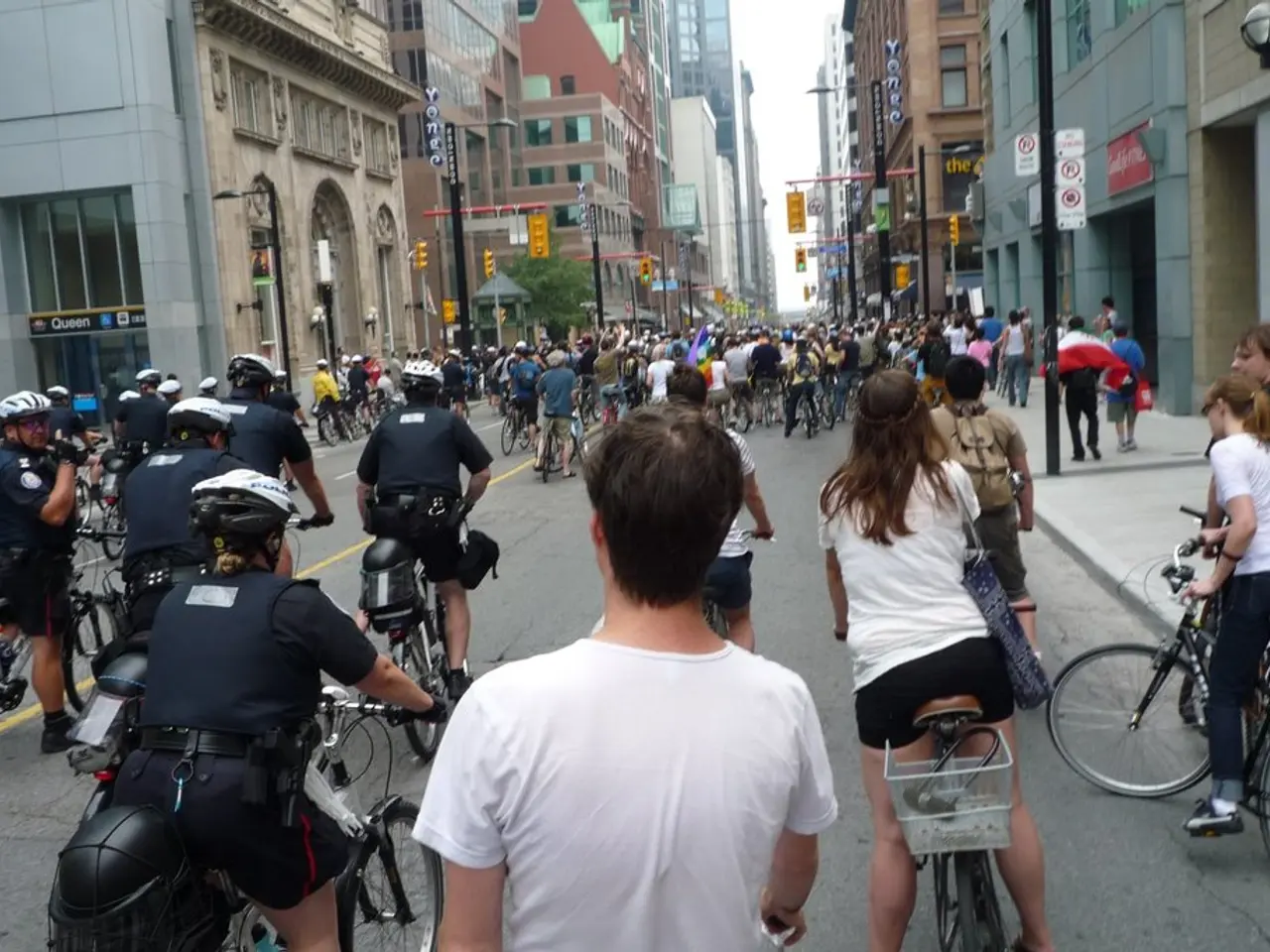Urban shift towards bicycle restrictions and eco-friendly city transportation
In the bustling city of Hanoi, Vietnam, a significant shift towards sustainable transportation is underway. With over 5.6 million motorbikes causing air pollution, traffic congestion, and safety concerns, the city is taking bold steps to promote greener, more eco-friendly mobility.
Starting July 1, 2026, Hanoi will ban all gas-powered motorcycles and scooters from the central area within Ring Road 1. This ban will expand to larger areas by 2028 and cover the entire city by 2030. This move is a part of Hanoi's commitment to combat air pollution and reduce CO2 emissions, noise, and particulate pollution caused by traditional motorcycles.
The government is not just enforcing restrictions; it is also encouraging the replacement of internal combustion engine (ICE) motorcycles with electric vehicles (EVs). Local manufacturers like VinFast, which is focusing on electric two-wheelers, are being supported in this transition. The aim is not only to reduce emissions but also to foster the adoption of greener travel alternatives.
Hanoi's approach is phased, extending restrictions gradually from the city center outward to larger ring roads over several years. This gradual transition encourages shifts to electric or other sustainable modes of transport rather than an immediate outright ban.
Apart from Hanoi, other cities worldwide are also adopting similar strategies. Major cities like Guangzhou (China), Yangon (Myanmar), and entire countries like the Netherlands have implemented restrictions on ICE vehicles in city centres. In some countries, big cities have successfully banned motorbikes in their central areas.
To make the transition smoother, technology can play a crucial role. A national app integrating metro, buses, ride-hailing, and bike sharing could be developed to connect routes "door to door", showing the real cost and time between riding a motorbike and taking public transport. This would help people make informed decisions about their travel choices.
Moreover, the country should consider incentivizing the trade-in of old gas motorbikes for electric bikes or public transport vouchers. If people find that they do not save time, money, or comfort when riding a motorbike compared to taking the metro, they may switch to public transport without being asked.
Public education campaigns on multi-modal transport culture should also be run to promote this shift. The shift towards sustainable transportation is about changing travel behavior, encouraging people to choose public transport over motorbikes.
Vietnam should expand public bike-sharing systems around stations and promote private shuttle services from residential areas to major transit hubs. With proper planning and inclusive execution, green mobility can be a cultural evolution in Vietnam.
Banning fossil-fuel motorcycles in central Hanoi is a signal that Vietnam is ready to join the ranks of progressive cities embracing clean air, efficient public transport, and healthier urban living. The country's commitment to sustainable transportation is not just about meeting environmental goals; it's about creating a better quality of life for its citizens.
[1] Nguyen, T. (2021, March 10). Hanoi to ban motorbikes from city center by 2030. Vietnam News. https://vietnamnews.vn/society/784314/hanoi-to-ban-motorbikes-from-city-center-by-2030.html
[2] Vo, T. (2021, March 10). Hanoi to ban motorbikes from city center by 2030. Reuters. https://www.reuters.com/world/asia-pacific/hanoi-to-ban-motorbikes-from-city-center-2030-2021-03-10/
[3] Pham, L. (2021, March 10). Hanoi to ban motorbikes from city center by 2030. CNN. https://edition.cnn.com/2021/03/10/asia/hanoi-motorbike-ban-climate-change-intl-hnk/index.html
[4] Le, T. (2021, March 10). Hanoi to ban motorbikes from city center by 2030. BBC News. https://www.bbc.com/news/world-asia-56333377
[5] Tuan, N. (2021, March 10). Hanoi to ban motorbikes from city center by 2030. The Guardian. https://www.theguardian.com/world/2021/mar/10/hanoi-to-ban-motorbikes-from-city-centre-by-2030
- As Hanoi aims to combat air pollution and reduce CO2 emissions from traditional motorcycles, the government is also pushing for replacements of internal combustion engine motorcycles with electric vehicles.
- Apart from Hanoi, many cities worldwide are adopting similar strategies, such as Guangzhou, Yangon, and entire countries like the Netherlands, in implementing restrictions on ICE vehicles in city centers.
- Technology could play a crucial role in making the transition smoother, with a national app developed to show the real cost and time between riding a motorbike and taking public transport, promoting informed decisions.
- To facilitate the shift towards sustainable transportation, Vietnam should consider incentivizing the trade-in of old gas motorbikes for electric bikes or public transport vouchers.
- Vietnam's commitment to sustainable transportation is not just about meeting environmental goals; it's about improving the quality of life for its citizens by embracing clean air, efficient public transport, and healthier urban living.




